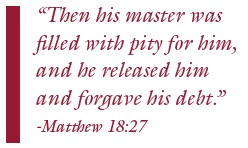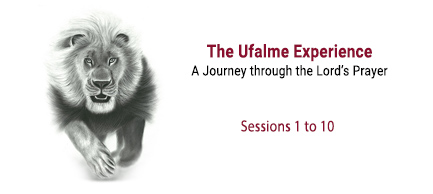Back to series


Read and reflect on the following article by Professor Josephine Mutuku
(Download this article as a PDF).
How many times shall I forgive my brother?
Peter posed this question to Jesus in Matthew 18:22. He thought he was being generous by offering to forgive up to seven times. But Jesus’ response to Peter’s question surprises His audience. He offers a new perspective of forgiveness, that one should forgive seventy-seven times the sins of his fellow brother.
Peter’s question exposes his heart. Peter did not consider that he might sin against his brother. Like most of us, he was more concerned with being wronged by others than with his own sin.
Jesus’ response looks impossible to many. The number of times that one should forgive his brother is unlimited. It can be likened to the number of times that God can avenge for the sins of someone (Gen. 4:24). Forgiveness should be all the time. Love covers multitudes of sin, and where there is love, there are no limits of forgiveness. A constant forgiveness helps us overcome sin in our own lives.
How great is our debt?
The king in this parable decided to settle accounts with his servants, and his verdict was that anyone who was unable to pay whatever amount he owed the king would be sold off. The debt that the servant owed was ten thousand talents, a huge amount that the servant was unable to pay.
We owe God our lives. The penalty for sin is death, and because of our sin and the sin committed by our forefathers in the Garden of Eden, we are required to settle our debt of sin with our master by death (Gen. 2:15-17). God has already judged sin and we must pay its equivalent. This does not mean that God is not fair, His justice and righteousness demands that we pay the penalty.
Who will settle our debt of sin?
 The servant was at the judgment of the king to decide his fate. His debt could not be paid in a short time but required more than an entire lifetime of work. In his mercy, the king chose to forgive the servant unconditionally setting him free.
The servant was at the judgment of the king to decide his fate. His debt could not be paid in a short time but required more than an entire lifetime of work. In his mercy, the king chose to forgive the servant unconditionally setting him free.
Jesus, who is our king, chose to pay the very high price for our debt of sin. We are sinners (Romans 3:23), and our penalty is death but the gift of God is eternal life in Christ Jesus (Romans 6:23). The servant in the narrative did not deserve to be set free but the love and mercy of the king set him free. It is this kind of love that God gives us (John 3:16) and that sets us free from the bondage and slavery of sin. God had mercy on us and sent His only Son as a ransom for our sin. It is by grace that we can receive such a gift from God without any strings attached. We receive the offer given to us by believing in Jesus Christ and the work He did on the cross on our behalf.
The prison of unforgiveness
The servant who was forgiven did not regard the mercy that the king showed him. He took pride in himself; he saw himself as entitled. He went ahead and threw his fellow servant to prison for not paying what was owed him. What the fellow servant owed was little compared to what he owed. He forgot that he could have been behind bars in prison until he settled his debt with the king.
Because the man did not reflect on his own forgiveness, he failed to listen to the pleas of his fellow servant. His unforgiving heart led him to prison.
The love of God should be our example
The moral and spiritual lesson we can learn from this narrative is that we can choose to forgive or we can imprison ourselves through unforgiveness. Christians are brethren in Christ, and they ought to forgive one another just as God has forgiven each one of them. This does not apply to Christians alone; it should extend to those who do not have a relationship with God so that they can too think about such a great love, be convicted, and come to God in repentance.
God’s mercy leads us to forgiveness. When we experience God’s mercy and recognize the cost He paid for our sin, we are led to extend forgiveness to others.
We’re encouraged to show this kind of unconditional love as we settle our wrong-doings or trespasses with our brothers, friends, fellow workers, and neighbours. As we forgive one another the kingdom of God comes in our midst.

Josephine Mutuku
ProfessorProf. Josephine Mutuku is the head of the Missions Studies Department and a Senior Lecturer at Africa International University. She holds a Bachelor’s in Theology from Scott Theological College, an MDiv. from Nairobi Evangelical Graduate School of Theology, and a PhD in Intercultural Studies from Fuller Theological Seminary.

 COPYRIGHT: This publication is published by C.S. Lewis Institute; 8001 Braddock Road, Suite 301; Springfield, VA 22151. Portions of the publication may be reproduced for noncommercial, local church or ministry use without prior permission. Electronic copies of the PDF files may be duplicated and transmitted via e-mail for personal and church use. Articles may not be modified without prior written permission of the Institute. For questions, contact the Institute: 703.914.5602 or email us.
COPYRIGHT: This publication is published by C.S. Lewis Institute; 8001 Braddock Road, Suite 301; Springfield, VA 22151. Portions of the publication may be reproduced for noncommercial, local church or ministry use without prior permission. Electronic copies of the PDF files may be duplicated and transmitted via e-mail for personal and church use. Articles may not be modified without prior written permission of the Institute. For questions, contact the Institute: 703.914.5602 or email us.
Speakers

Josephine Mutuku
Professor
Team Members

Josephine Mutuku
ProfessorProf. Josephine Mutuku is the head of the Missions Studies Department and a Senior Lecturer at Africa International University. She holds a Bachelor’s in Theology from Scott Theological College, an MDiv. from Nairobi Evangelical Graduate School of Theology, and a PhD in Intercultural Studies from Fuller Theological Seminary.



